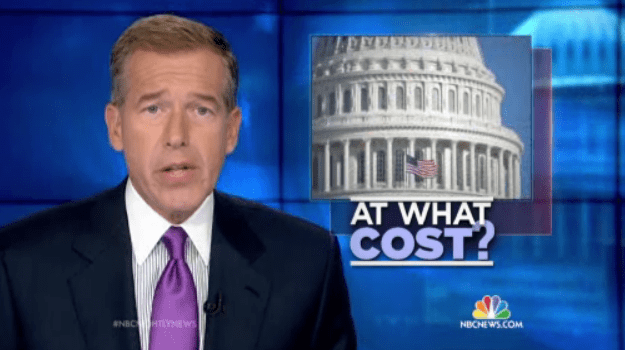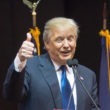(Brian Williams | Source: NBC News)
The government shutdown is, in some ways, a really easy story to understand—if the press wants to report it that way. The Republican House passes a spending bill that would fund the federal government—and defund or delay certain provisions of the Affordable Care Act. The Senate, with its Democratic majority, refuses to pass this bill. So that’s the stalemate, right? That’s the way the media report it.
PBS anchor Judy Woodruff told viewers:
Republicans refused to budge on their demands to delay parts of the president’s healthcare law. Democrats remained adamantly opposed to those demands.
On NBC Nightly News, Brian Williams reported:
The simplest way to put it is this: The Republican-controlled House is passing bills the Democratically controlled Senate keeps rejecting. The bills would keep the government operating while stopping aspects of the new healthcare law. And that’s where we are.
USA Today‘s Susan Page observed that the shutdown was “the latest and most dramatic demonstration of an increasingly dysfunctional capital” where “the traditional ways of reaching compromises no longer apply.” She explained that “House Republicans have insisted on defunding or delaying Obamacare, a demand the White House and Senate Democrats have flatly rejected. Rock, meet hard place.”
| Nothing promotes political irresponsibility more than the knowledge that whatever you do, the media will blame both sides. |
That’s true, in a way—but also misleading. The House could hold a vote on a spending bill along the lines of the Senate bill—one that funds the government without trying to undermine Obamacare—what’s called a “clean CR,” or continuing resolution. And congressional observers say it would pass, supported by a majority of representatives—if House Speaker John Boehner would allow it to come up for a vote.
But Boehner, following the lead of a minority of his own party, is committed to a strategy—shutting down much of the federal government unless the Senate agrees to gut a law that was passed by both houses of Congress, signed by the president and upheld by the Supreme Court—that is unprecedented in its extreme approach to getting one’s way in Washington.
But this hardly gets the attention it deserves. A front-page USA Today piece made this admission near the very end of a front page piece about the looming shutdown:
Boehner could put the “clean” Senate-passed funding bill on the House floor, where it would likely pass on the support of House Democrats with some Republicans, but he is under pressure from conservative lawmakers and outside groups to hold the line.
Pointing this out, though, would challenge the media to declare one side more responsible for a crisis than the other—something establishment news outlets are disinclined to do. There have been some exceptions—like a Huffington Post report bluntly titled, “John Boehner Could End Shutdown Today if He Wanted To.”
But the press is full of “everyone’s behaving badly” stories and punditry. Pundit Stuart Rothenberg on the PBS NewsHour, for instance, lamented that “I think both sides have just staked out a very extreme position, portraying the other side as full of ill will and anger and extreme and uncompromising.” The Washington Post had an article about the partisan messaging war: “In Shutdown Blame Game, Democrats and Republicans United: It’s the Other Side’s Fault.”
The Post explained that there was a “heated back-and-forth” about blame, acknowledging that “the challenge is steepest for the GOP, which faces a hardening public perception that it is primarily to blame for setting the crisis in motion.”
That “perception” also happens to be reality. But insider journalists seem too unwilling to just say so. The Washington Post‘s Dan Balz wrote that the “two warring parties … had a similar message: The fault lies elsewhere for the disruptions that the closures will produce.”
Balz seemed pretty clear about who he thought was more to blame. He wrote that Barack Obama was lobbing “rhetorical grenades” at the GOP, and that “his healthcare law … is the sole reason the government is partly shuttered and the political system in the capital paralyzed.” That’s a very odd way of looking at the conflict, to say the least.
Balz added that Senate majority leader Harry Reid’s “dismissals of the Republican tactics grow more flagrant and inflammatory by the day, which is not likely to serve Democrats well in the long run.”
The truth is that the shutdown is the work of a small group of House Republicans and Speaker John Boehner. Media like to dismiss the partisan “blame game,” but in cases like this placing blame is something that journalism ought to do. Because there’s nothing that promotes political irresponsibility more than the knowledge that whatever you do, the media will blame both sides equally.
Peter Hart is the activism director at Fairness & Accuracy in Reporting. He writes for the FAIR Blog, where this originally appeared.






0 Comments